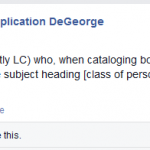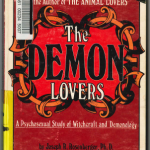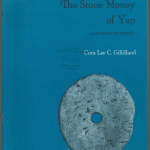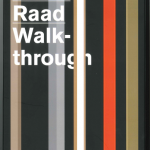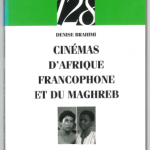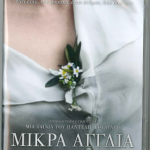A public service announcement from Deb, in Troublesome Catalogers and Magical Metadata Fairies.
Month: November 2014
The demon lovers : a psychosexual study of witchcraft and demonology / by Joseph R. Rosenberger ; introduction by Karl von Gottlieb. (OCLC #52633985)
RDA 7.7 (Intended Audience) is the class of user for which the content of a resource is intended, or for whom the content is considered suitable. It may be defined in many ways, including by age group (e.g., children, young adults, adults), and may be taken from any source.
This piece states its intended audience directly on the cover (“Positively adults only!”) so we could record that in the new MARC 385 field (defined in Tech Bulletin 264), as well as in the Audn fixed field (“e”).
In RDA, Intended Audience is not generally considered core, but for LC, it is core for books intended for children; for NLA it is core if readily ascertainable. This book is not intended for children, and we don’t consistently code the element (or consider it important for selection in our library) so I did not record this information when upgrading the master record.
(As a bonus, a previous patron has helpfully scribbled the review “Garbage!” on the title page of our local copy!)
The stone money of Yap : a numismatic survey / Cora Lee C. Gillilland. (OCLC #1255837)
The subject heading for Yap is:
Yap (Micronesia)
(direct order) so if that were the main subject of the title, that subject would be assigned in a 651. The authority record for that heading includes this field:
781 _0 ǂz Micronesia (Federated States) ǂz Yap
The 781 field is “Subdivision Linking Entry-Geographic Subdivision”, so indicates how that heading should be used as a geographic subdivision of a topical heading (indirect order). In this bib record, this appears as:
650 _0 ǂa Ethnology ǂz Micronesia (Federated States) ǂz Yap.
Walid Raad, walkthrough. (OCLC #890913763)
This title consists of one pamphlet and seven posters, gathered inside a colorful case. There are several records for it in OCLC, and each handles the physical descriptions in different ways, depending on what the cataloger judged to be was the primary content:
300 __ ǂa 2 v. : ǂb col. ill. ; ǂc 22-24 cm., in slipcase 25 cm.
+ ǂe 6 posters.
300 __ ǂa 6 v. (in slipcase) : col. ill. ; 26 cm.
300 __ ǂa 96 p. ǂb ill. ǂc 25 x 18 cm
I preferred the conciseness of this record:
300 __ ǂa 1 case : ǂb color illustrations ; ǂc 26 cm.
with the details of the contents in a 500 note. RDA 3.4.1.3 (Recording Extent) says to use units from the list of carrier types (“case” is not on this list), but provides an alternative to use a word in common usage (including a trade name) instead.
British Library has an interesting PS for this rule:
Apply alternative b) for hand held digital resources if the appropriate term in common usage is readily ascertainable; for example, use the terms CD-ROM, DVD and DVD-ROM in preference to using a term from the list of carrier types at 3.3.1.3
Cinémas d’Afrique francophone et du Maghreb / Denise Brahimi. (OCLC #37413829)
While you can search titles for words using diacritics in Connexion client (there is a button to Enter Diacritics), you will find them just as easily typing them without, like for “cinémas”, you can search:
cinemas
Similarly, some punctuation between letters does not separate them into multiple words in the index, so you can search for “d’Afrique” as:
dafrique
Words with apostrophes index with a space as well, so you could also find this record with the search:
"d afrique"
but this would not retrieve records where a right single quote (’) is used, like in this record, so I am usually happiest using no space.
Other punctuation marks have different behavior. For example, periods, commas or hyphens between words are equivalent to space, so this title is also retrieved by the search:
francophone-et,du.maghreb
Mikra Anglia. (OCLC #883268494)
Transliteration can be more than a strict single character-by-character substitution. For example, the ALA-LC Romanization table for Modern Greek equates the vernacular “γγ” with “ng” rather than “gg”.
The cataloger also supplied a translation of the title in a 242:
242 10 ǂa Little England. ǂy eng
